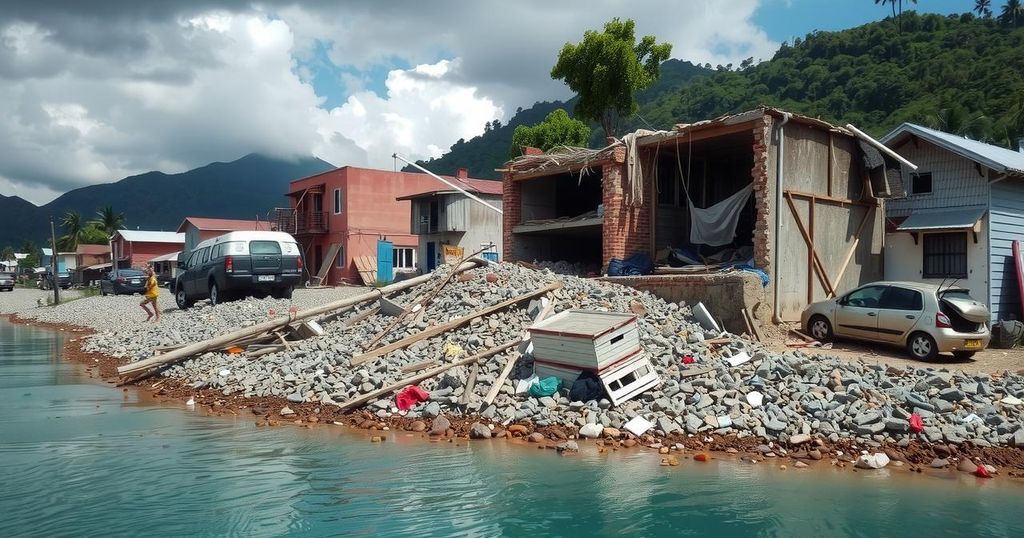World news
ANDREW CARNEGIE, ASIA, BERLIN, BIG FOUR NATIONS, DEMOCRACY, EUROPE, GEORGES CLEMENCEAU, GERMANY, GOVERNMENT, HAITI, HATTIE CARAWAY, JAMARAT, LEGISLATION, MINA, NORTH AMERICA, OF NATIONS, OFFICE OF PRICE ADMINISTRATION, PHILIPPINES, POLITICS, PORT - AU - PRINCE, PRESIDENTIAL ELECTIONS, THEODORE ROOSEVELT, UP, UPI
Oliver Grayson
0 Comments
Historical Significance of January 12: From Haiti’s Earthquake to Key Political Events
January 12 marks numerous historical events, including Andrew Carnegie’s testimony in 1912 and the catastrophic 2010 earthquake in Haiti, which claimed over 100,000 lives and triggered a cholera outbreak. Additionally, this day saw milestones in women’s representation in the U.S. Senate and significant space exploration achievements. More recently, in 2024, the U.S. conducted military retaliation against Houthi threats in the Red Sea.
On January 12 throughout history, significant events have unfolded. In 1912, industrialist Andrew Carnegie testified before the Stanley Committee, aligning with former President Theodore Roosevelt’s anti-trust stance against President Taft’s trust dissolution plans. A few years later, in 1919, U.S. President Woodrow Wilson and leaders of the United Kingdom, France, and Italy gathered in Paris, starting over 100 meetings to discuss peace terms following World War I and establishing the League of Nations.
In 1932, Hattie Caraway made history as the first woman elected to serve a full term in the U.S. Senate. During World War II, on January 12, 1943, the U.S. Office of Price Administration announced that standard frankfurters would be substituted with “Victory Sausages,” blending meat with soy meal. Fast forward to 1986, when U.S. Representative Bill Nelson took a monumental journey into space aboard the shuttle Columbia, accompanied by Franklin Chang-Diaz, the first Hispanic American in space.
In a political context, on this date in 1994, President Bill Clinton called for an independent investigation into the Whitewater land deal, appointing Robert Fiske to oversee the inquiry. Tragically, in 2006, a pilgrimage incident in Saudi Arabia resulted in 350 lives lost due to a stampede at the Jamarat Bridge.
The year 2010 marked a devastating earthquake that struck Haiti with a magnitude of 7.0, leading to the death of at least 100,000 people and causing extensive damage to the nation’s already fragile infrastructure. This disaster subsequently triggered a cholera outbreak that claimed thousands of additional lives over the ensuing years. On January 12, 2024, it is reported that the United States and allied forces conducted a significant retaliatory operation following recent Houthi attacks in the Red Sea, underscoring the ongoing geopolitical tensions in the region.
January 12 has been a day marked by events that have shaped legal, political, and humanitarian landscapes globally. From historic testimonies in Congress to groundbreaking achievements in women’s representation and space exploration, this date has seen dynamic shifts in societal norms and political actions. The devastation of the 2010 Haiti earthquake not only impacted that nation profoundly but also drew international attention to challenges surrounding disaster response and public health, particularly regarding the cholera outbreak that followed. Recent military actions underscore the continuing complexities of international relations and conflict management.
In summary, January 12 has played host to a variety of historical milestones, reflecting critical advancements and tragic events. The significant legislative actions, international communications, and natural disasters highlight humanity’s ongoing struggle with governance, health crises, and global security. Notably, the catastrophic earthquake in Haiti remains a poignant reminder of the vulnerabilities faced by nations and the importance of international solidarity in disaster response and recovery.
Original Source: www.upi.com




Post Comment